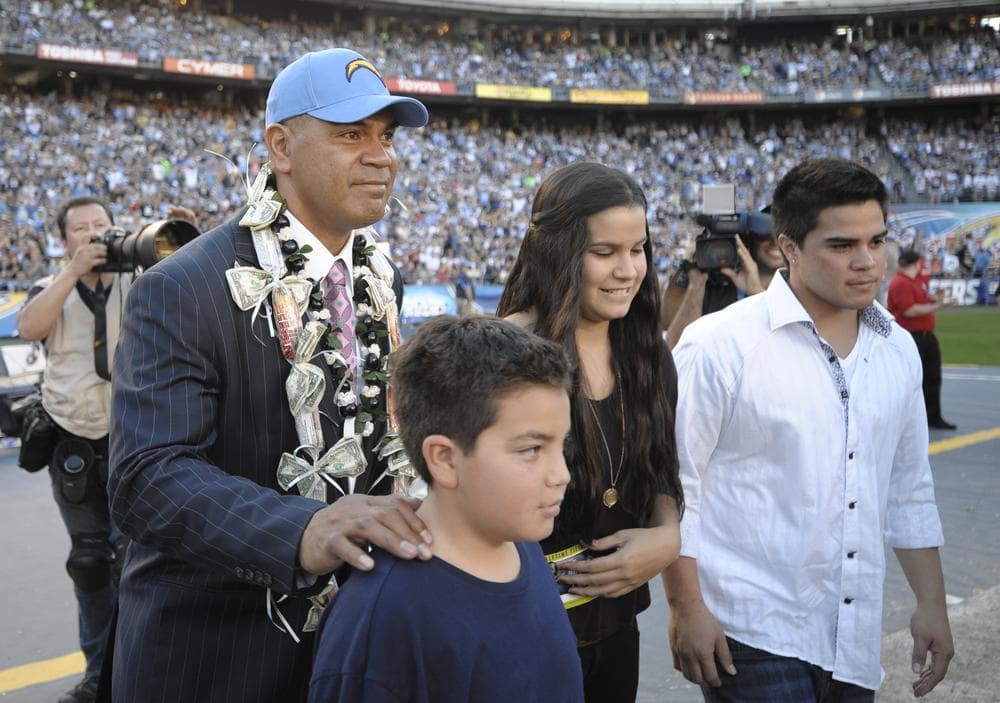Advertisement
In-Depth
Researchers Compete For Athletes' Brains
Resume
Let's start with what we don't know.
We don't know if Junior Seau suffered from Chronic Traumatic Encephalopathy, a disease that causes depression, mood swings, and erratic behavior in those who have suffered multiple concussions.
We don't even know for sure if Seau suffered from multiple concussions. His ex-wife thinks there might have been many. A former teammate guesses as many as 1,500.
If Seau's family allows his brain to be studied, as some organizations are reporting they have, we don't know what the results will be... or if the family will even choose to share the results with the public.
But we do know that for the past week and a half, Junior Seau's family has been faced with these questions: whether or not to donate his brain to science and which research organization should receive the gift.
Things were simpler in 2002, when Mike Webster died of heart disease and other complications, and Dr. Bennett Omalu — the forensic pathologist performing the 17 year NFL veteran's autopsy — asked if he could look further into what may have caused Webster's trouble late in life. Webster's son, Garrett, says his family didn't hesitate.
"We kind of didn't give it a second thought. We were so wrapped up in grief and wrapped up in the other things that were going on."
The study of the brain has always been characterized by competition.
Dr. Art Caplan
"It was definitely something that finally gave us peace — that those times that Dad struggled, or the times that Dad maybe yelled at us or was depressed, it wasn't something we did," Garrett said. "When we found out what was happening it made us feel better."
Now, Garrett Webster asks other families to donate to the Brain Injury Research Center, the West Virginia institution where Omalu and other doctors study the long term effects of concussions.
But Webster's phone call is not the only one a family is likely to receive. Chris Nowinski, the co-director for the Boston University Center for the Study of Traumatic Encephalopathy, has said in the past that he's placed hundreds of calls to family members within 48 hours of a loved one's death, asking them to donate to a brain bank in Massachusetts.
Garrett Webster says the most important thing is that the research be done by someone, but he acknowledges that he's in competition for brains of deceased athletes.
"We believe our doctors are the best," Webster explained. "We were the people that discovered the disease. We looked at more brains than anybody else. We are 100 percent independent organization; we do not accept money from the NFL or any other professional sports league. So of course we're going to feel like we're the 'best.'"
[sidebar width=250 align="right"] Listen to OAG's previous coverage of the Boston Center for the Study of Traumatic Encephalopathy from 2007 and 2008. [/sidebar]
Boston University declined to comment for this story, saying "It is our policy not to discuss any completed, ongoing or potential research cases unless at the specific request of family members. Our primary goal is to learn more about the long-term effects of repetitive brain trauma by conducting meaningful scientific research."
The Boston University center does list the National Football League and the NFL Player's Association among its sponsors, something that Dr. Art Caplan, the outgoing director at the University of Pennsylvania's Center for Bioethics, says isn't ideal.
"One has to at least raise both eyebrows when research is funded by someone that has a direct interest," Caplan said. "In ethics we call that a conflict of bias and it means that because you have a dog in the fight, you have an outcome that perhaps could be skewed if you're funding the research as well."
Dr. Caplan says families need to weigh potential bias and other factors. It's not the easiest thing to do when faced with an unexpected or sudden death. Caplan suggests an advocate could help survivors navigate the complicated issues surrounding donation of a resource that is in incredibly high demand.
"The study of the brain has always been characterized by competition," Caplan explained. "There are relatively few people from all walks of life who donate their brains upon death. There are many people in the scientific community who would like to analyze the brain for all sorts of reasons."
As deaths like Seau's bring more public attention to the issue, that demand is only going to grow. Suddenly grant money is flowing and everyone is an expert. Even a 15-year-old high schooler was recently awarded $25,000 for developing a cheaper way to monitor big hits. It's a phenomenon about which Dr. David Hovda, director of the UCLA Brain Injury Research Center, has a good sense of humor.
"I was asked by a colleague of mine in Canada how many traumatic brain injury specialists there were in the United States," Hovda said, laughing. "I said, 'Well, 10-15 years ago there were probably 200 of us in the United States. Now I think there are probably 20,000 of us.'"
Dr. Hovda says until recently the only brain bank for traumatic brain injury resided in Glasgow, Scotland. Now, he says, the United States needs a collection of brain banks or data centers where specimens and the knowledge that comes from them will not become proprietary.
This segment aired on May 12, 2012.
